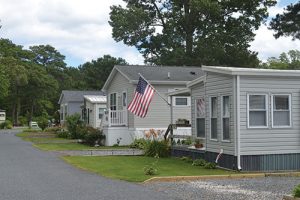
SNOW HILL – The legal dispute regarding occupancy at White Horse Park continues to move ahead.
On Jan. 7, a Worcester County Circuit Court judge granted a request from White Horse Park’s board of directors to intervene in the lawsuit filed against Worcester County by some permanent residents of the park. The board’s attorney subsequently filed a countercomplaint asking the judge to order year-round occupants to abide by the park’s seasonal restrictions.
“In addition to the county law prohibiting year-round occupancy in the park, the recorded declaration that established the park prohibits year-round occupancy, and the board has the fiduciary obligation to enforce that declaration, even if previous boards may have failed to do so,” the board’s attorney, James Almand, wrote in a Jan. 8 email to the board. “Therefore, in my opinion, the park should be a party in the pending case so that its voice can be heard.”
In November, a group of residents initiated a lawsuit against Worcester County over its plan to enforce decades-old occupancy restrictions in White Horse Park (WHP). While some people have lived in the park fulltime for years, the county in 2018 began efforts to bring the 465-unit community into compliance with its zoning restrictions, which state that between Sept. 30 and April 1 units can’t be occupied more than 30 consecutive days or an aggregate of 60 days.
Though the fulltime residents initially tried to amend county code to allow them to remain in their homes, the Worcester County Commissioners rejected the proposed text amendment and announced they’d begin fining residents who didn’t abide by the park’s occupancy restrictions. Those fines have yet to be issued but fulltime residents are hoping, through the administrative appeal and complaint for declaratory judgement filed in November, to have a judge decide they’re not legal. Attorney Hugh Cropper, who represents the fulltime residents, contends the county has waived its right to fine people in this situation since officials have known people lived in the park year-round since the 1990s.
While some blame the park’s leadership for letting the occupancy issue get to this point, the current five-member board voted to pursue involvement in the case at the end of 2019.
In the weeks since, resident Sue Naplachowski — one of the plaintiffs in the lawsuit against the county — appealed to her fellow WHP property owners, reminding them that most of the fulltime residents involved in the case were elderly. She also advised that they were using their own funds, as well as generous donations, to fight the legal battle against Worcester County.
“On the other hand, the board is using money from White Horse Park to pay additional lawyer fees against the fulltime residents,” she wrote in letter to lot owners. “This makes no sense, since Worcester County (with whom the WHP Board is now fully collaborating) is spending county funds to pay their own lawyer from an expensive Baltimore law firm to fight against the park’s full-time residents.”
Accompanying her letter is a survey asking lot owners to vote “yes” or “no” to use park funds to pay Almand.
Almand, in turn, emailed Melissa Peters, president of the board, Jan. 8. That email has been shared on the WHP website.
“I recommended to the board that White Horse Park intervene in the above-referenced case because White Horse Park has a vested interest in the outcome of the case and should have been a party at the outset,” he wrote. “Contrary to the assertions of Ms. Naplachowski and other advocates for year-round residency in the park, the pending lawsuit is not limited to ‘the elderly, handicapped, fixed income residents living year-round in the park.’”
Almand said that because the plaintiffs were seeking an order declaring that Worcester County could not levy fines or attempt to evict permanent residents, if they were successful anyone could be a permanent or fulltime resident of the park.
He also addressed Naplachowski’s concerns about the cost of the litigation.
“…she and the other plaintiffs can stop that cost by terminating the lawsuit,” he wrote. “Assuming the case proceeds as litigation typically does in Circuit Court, I estimate that my fees for the litigation will cost each lot owner $25 to $30, which is a small price to pay to stop the attempts by Ms. Naplachowski and others to make the park a year-round community contrary to the developer’s intention, the recorded declaration and county law.”

